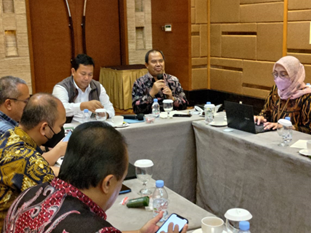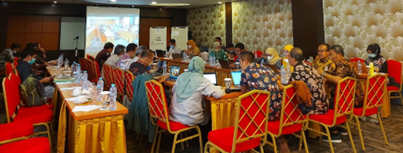Accelerating Social Forestry
In an effort to accelerate the implementation of Social Forestry development, the Directorate-General of Social Forestry and Environmental Partnerships (PSKL) prepared a Draft Presidential Decree (Raperpres) on Integrated Planning for the Acceleration of Social Forestry Management in early 2022. To this end, several coordination meetings were conducted, with preparation and discussions of academic papers being carried out by consultants with support from FORCLIME. On 30 May 2023, the government issued the final Presidential Decree, which contains a set of guidelines that specifically address the planning, implementation and evaluation of Social Forestry development.
In accordance with this Presidential Decree, Social Forestry is defined as a sustainable forest management system that is implemented in areas of state forest or private forest/customary forest by local communities or customary law communities as main actors in order to improve their welfare, environmental balance and socio-cultural dynamics. Such forests generally take the form of village forests, community forests, community plantation forests, customary forests and forestry partnerships.
Previously, provisions relating to Social Forestry were specifically set out under Minister of Environment and Forestry Regulation Number 9 of 2021 on Social Forestry Management and were also included under Articles 29A and 29B of Law No. 11 of 2020 on Job Creation (UUCK). This law forms the basis of Government Regulation Number 23 of 2021 on Forestry Administration, which specifically regulates integrated planning for the acceleration of Social Forestry management in one of its articles. According to this Presidential Decree, integrated planning is planning that is undertaken in order to support the acceleration of Social Forestry management in an integrated and comprehensive manner through ministries/agencies, provincial regional governments, district/city regional governments and related parties. Meanwhile, the acceleration of Social Forestry management involves collaborations between parties that are aimed at accelerating the achievements of Social Forestry management targets in various holistic, integrated, thematic and socially involved ways.
This Presidential Decree serves as a guide for the various parties involved, which not only comprise related ministries/agencies but also local governments, business actors, academics and community organizations as they engage in the planning, implementation and evaluation of Social Forestry development. This means that parties have clear references to consult when carrying out Social Forestry development as part of regional developments that are aimed at realizing a more prosperous society based on sustainable forest management.
During a limited meeting which was held online on 3 November 2020, President Joko Widodo emphasized two directives regarding Community Economic Empowerment Based on Social Forestry, specifically:
- Support for follow-up programmes so that communities around forests have the ability to participate in various aspects of Social Forestry business, which not only encompass agroforestry but which may also take the form of eco-tourism and agrosilvopastoral businesses, as well as bioenergy and non-timber forest products (NTFPs), and
- Preparation of production facilities and infrastructure, as well as adequate training so that Social Forestry business groups can develop properly and become examples that other Social Forestry business groups can subsequently model themselves on.
Three main issues relate to integrated planning and are the subjects of discussion under the Presidential Regulation in question, namely the distribution of legal access, the development of Social Forestry businesses and assistance. The Integrated Plan for the Accelerated Management of Social Forestry will be implemented during the 2023 - 2030 period. During this timeframe the distribution of legal access across an area of 7,380,000 hectares will be carried out through the implementation of several strategies, specifically: the determination of priority scales for the granting of legal access to Social Forestry, the handling of tenure conflicts in forest areas and the strengthening of the mechanism for and the accelerated granting of Social Forestry Management Approvals.
The substance of the Presidential Decree includes acceleration efforts, targets, strategies, programs and activities, determinations of Integrated Area Development (IAD), implementation, monitoring and evaluations, support for parties, digitally-based information systems and aspects relating to financing.
Preparatory process for the Draft Presidential Decree on Integrated Planning for the Acceleration of Social Forestry Management
The Presidential Decree on Integrated Planning for the Acceleration of Social Forestry Management was prepared in stages through a number of meetings and discussions which gave voice to the various aspirations of the parties concerned, some of which were supported by FORCLIME. The preparation of this Presidential Decree (Raperpers) began with the writing of a number of academic papers, which included input from academics and researchers. These academic papers were then discussed with the relevant ministries/institutions. In order to compile the Raperpers academic papers, PSKL worked with a team that comprised researchers from the National Research and Innovation Agency (BRIN) and representatives of the Community Forestry Communication Forum (FKKM).

Coordination Meeting, August 5, 2022 Photo: PSKL
One of the concepts discussed in the texts of the academic papers was that of joined-up government, namely the realization of consistent collaborations to support collective goals. In this regard, it is seen as necessary to collaborate on governance through integrated planning and in a democratic manner, including distribution of legal access, business development and assistance with regard to coordination and integration. Theoretically, the implementation of Social Forestry is not only reliant on good governance but, in addition, should be able to present something new regarding the overall concept that underlies good governance. This concept is based on four key principles: development, democracy, social inclusion, and cultural and historical context.
The Presidential Regulation on Integrated Planning for the Acceleration of Social Forestry Management was prepared by the Ministry of Environment and Forestry working in conjunction with related ministries/institutions, specifically: the Ministry of State Secretariat; the Coordinating Ministry for Maritime Affairs and Investment; the Ministry of Home Affairs; the Presidential Staff Office; the Ministry of National Planning and Development/Bappenas; the Ministry of Villages, Development of Disadvantaged Regions and Transmigration; the Coordinating Ministry for Economic Affairs; the Coordinating Ministry for Politics, Law and Security; the Coordinating Ministry for Human Development and Culture; and the Ministry of Agriculture.
After organizing several meetings to give voice to the aspirations of the relevant parties, particularly ministries/agencies, communities, business actors, academics, practitioners and non-governmental organizations, the Ministry of Environment and Forestry also held several harmonization meetings with the Ministry of Law and Human Rights. Subsequently, Presidential Regulation of the Republic of Indonesia Number 28 of 2023 on Integrated Planning for the Acceleration of Social Forestry Management was finally stipulated and promulgated on 30 May 2023. The Presidential Regulation contains 26 pages, as well as 40 pages of attachments to the Action Plan for the Acceleration of Social Forestry Management. A copy of Presidential Regulation of the Republic of Indonesia Number 28 of 2023 on Integrated Planning for the Acceleration of Social Forestry Management can be accessed via this link.
FORCLIME support
FORCLIME is a bilateral cooperation programme between the Government of the Republic of Indonesia and the Government of the Federal Republic of Germany which supports forestry development programs that are implemented by the Ministry of Environment and Forestry. These programs encompass Social Forestry, which is also a national priority that is being implemented by relevant ministries/agencies in conjunction with local governments.

Cross-ministerial coordination meeting held on 22 July 2022. Documentation: FORCLIME
To accelerate the management of Social Forestry, in early 2022, the Directorate-General of Social Forestry and Environmental Partnerships prepared a Draft Presidential Decree on Integrated Planning for the Acceleration of Social Forestry Management. FORCLIME supported PSKL activities by facilitating resource persons and also by facilitating several coordination meetings, activities and FGDs right up until the issuance of Presidential Decree No. 28 of 2023, as outlined above.
FORCLIME, in line with its project limitations, will continue to support activities that relate to the Social Forestry programme, particularly within its working areas, which cover the provinces of Central Sulawesi, Papua and Southwest Papua. As we move forward, FORCLIME, working at the national level, will support PSKL through dialogue on Social Forestry, including FGDs on Presidential Decree No. 28 of 2023.
For further information please contact:
R. Rizka Dewi Zuleika, Junior Adviser for Sustainable Forest Management
Mohamad Rayan, Adviser for Crosscutting Issues and Conflict Management
Wandojo Siswanto, Manager of Strategic Area Forestry Policy






